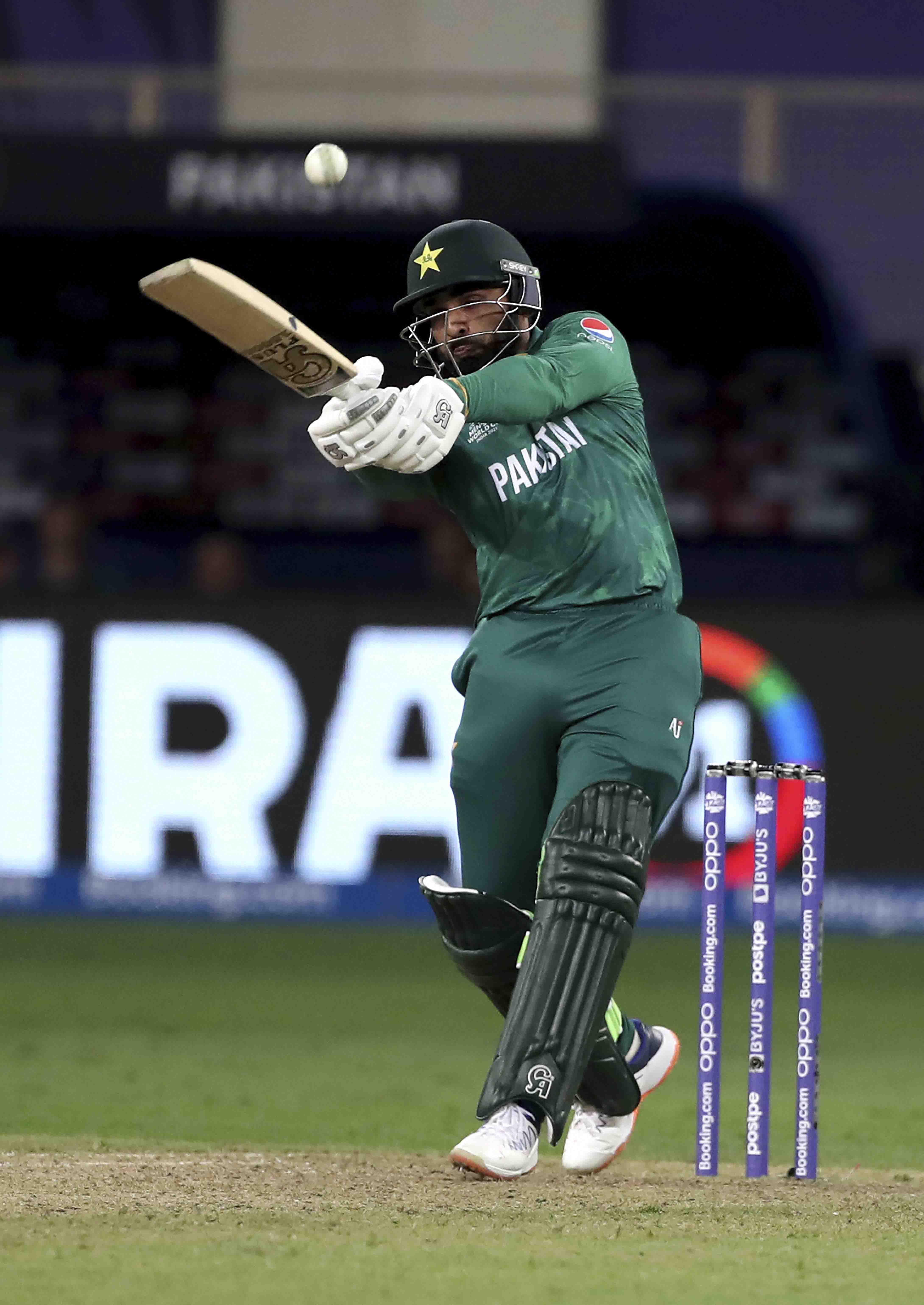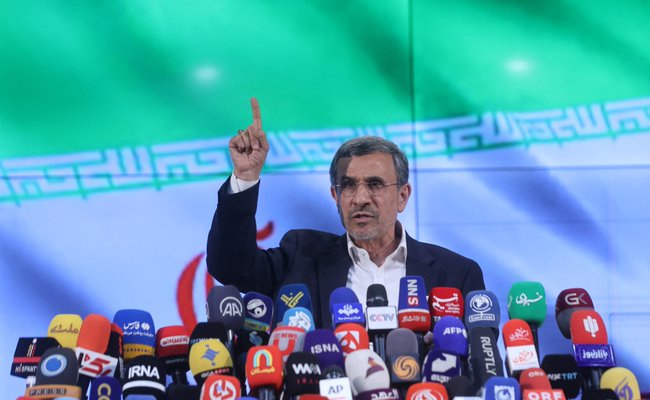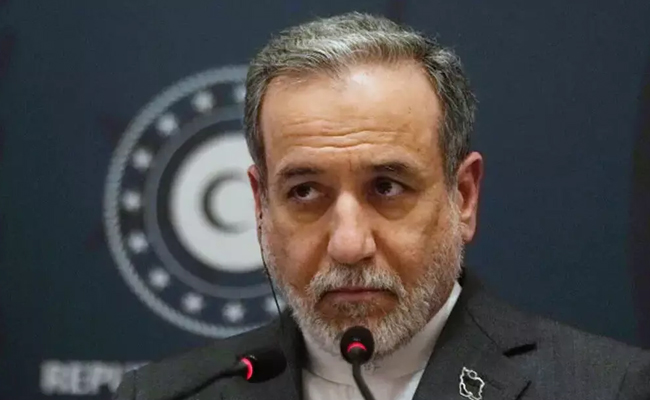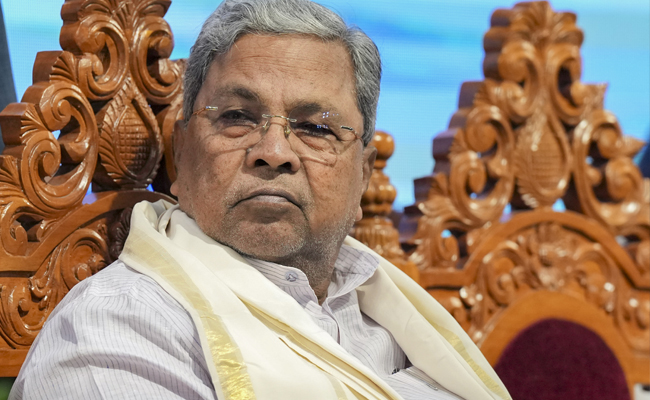Dubai, Oct 29: Skipper Babar Azam hit a composed 51 while Asif Ali hit four sixes in the penultimate over as Pakistan completed a hat-trick of victories in the T20 World Cup with a five-wicket win over Afghanistan in a Super 12 Group 2 match, here on Friday.
Skipper Mohammad Nabi and Gulbadin Naib's unbeaten knocks in a splendid rearguard action had steered Afghanistan to a competitive 147 for six after they were gasping at 76 for six.
Pakistan overhauled the target in 19 overs, a victory which consolidated their top spot in the points table and enhanced their semifinal chances with minnows Scotland and Namibia up next for them.
His side needing 24 runs from the last two overs, Asif Ali (25 off 7 balls) finished the job in 19th over, hitting four sixes off Karim Jannat.
Pakistan lost Mohammad Rizwan (8) to Mujeeb Ur Rahman early in their chase but Azam and Fakhar Zaman (30) kept the innings under control with their 63-run stand.
Mujeeb was exceptional upfront for Afghanistan as he conceded only 14 runs in his four-over spell but Pakistan batters scored runs off other bowlers.
World's top leg-spinner Rashid Khan carried Afghanistan's hopes but by the time he came to bowl Pakistan had put 72 runs on board in 10 overs.
His magic was on work though as he got rid of Mohammad Hafeez (10) to complete a century of wickets in T20 Internationals.
He gave away only 26 runs in his four overs with most of the Pakistan batters playing him with caution.
Shoaib Malik (19) though launched Rashid for a massive six in his last over in which Azam was dropped by Naveen ul haq. However, the Pakistan skipper was bowled off a googly in the last ball.
Azam's 47-ball knock had only four shots to the fence as he mostly moved the ball around.
Malik ended up caught behind when he flashed hard on a widish ball from Naveen, giving an easy catch to Mohammad Shahzad. Asif was at the crease and he did not disappoint his side.
Earlier, Pakistan's expansive attack dominated the proceedings but Nabi (35) and Naib (35) seized the momentum with their big-hearted effort under pressure and prevented it from becoming a one-sided contest.
They added 71 runs in 7.1 overs with 43 coming in the last three overs.
It all started when they creamed 21 runs from the 17th over bowled by Hasan Ali. Together they hit 10 boundaries.
However, initially Shaheen Afridi's probing yorkers, Haris Rauf's variation and the control of Imad Wasim and Shadab Khan tested the batters of Afghanistan, who opted to bat.
Pacer Afiridi created pressure on Afghan batters straightaway with his toe-targeting fiery first over and left-arm spinner Wasim followed that up with another tight over upfront.
The dot-ball pressure got the better of Hazratullah Zazai (0), who went after Wasim and ended up giving a catch to Haris Rauf.
Mohammad Shahzad (8) lifted Afridi's overpitched ball in the cover region to get the first boundary of the team but could not clear the mid-on one ball later to start his walk back to the dug out.
Realising that it will be difficult to score off Afridi, former skipper Asghar Afghan (10) and Rahmanullah Gurbaz (10) targeted Wasim and collected 17 runs from his next over, both hitting him for a six each.
However, Afghan's stay was cut short by Rauf while Gurbaz was sent back by Hasan Ali.
Afghan's younger brother Jannat (15) came to the crease and together with Najibullah Zadran (22) had the responsibility to keep afloat his side, which was tottering at 39 for four inside Powerplay overs.
It kept getting worse for Afghanistan as neither the runs came at a good pace and they kept losing wickets.
Jannat and Zadran were scalped by Wasim and Shadab respectively, leaving Nabi with a difficult task to put enough runs on the board to defend, which he did with Naib.
Let the Truth be known. If you read VB and like VB, please be a VB Supporter and Help us deliver the Truth to one and all.
Tehran: Iran’s ILNA News Agency has reported that former president Mahmoud Ahmadinejad was killed during the ongoing US and Israeli attacks.
According to ILNA, Ahmadinejad was killed following strikes in Tehran’s Narmak district, including an attack on his residence. The report said he died along with his bodyguards.
News of the deaths of three of Ahmadinejad’s bodyguards was released on February 28, coinciding with the first day of the US and Israeli attacks on Iran.
ALSO READ: Iran's foreign minister says new supreme leader will be chosen in 'one or two days'
Ahmadinejad served as Iran’s president from 2005 to 2013. He was widely known internationally for his hardline rhetoric against Israel and for accelerating Iran’s nuclear programme during his tenure. At home, his disputed re-election in 2009 led to the “Green Movement” protests across the country.
In recent years, Ahmadinejad had positioned himself as a populist critic of the current ruling establishment, though he continued to serve as a member of the Expediency Discernment Council, the body currently involved in helping shape temporary leadership arrangements.





